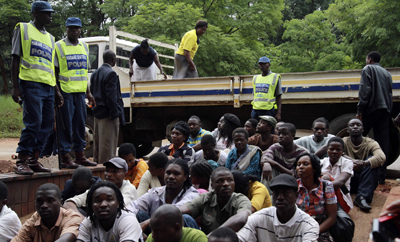The right to receive and impart information is a fundamental human right enshrined in the United Nations’ Universal Declaration of Human Rights, but in Zimbabwe, watching news of North African and Middle East protests apparently amounts to treason.
That seems to be the message Robert Mugabe’s government has sent with the February 19 arrests of 46 activists for attending a meeting organized by the International Socialist Organization at which footage of the protests were shown and discussed. “They were watching DVD news clips of the protests in Tunisia and Egypt,” Roselyn Hanzi, Head of the Human Rights Defender Project for the Zimbabwe Lawyers for Human Rights told CPJ. “It was nothing different to what many other Zimbabweans watched also.”
Instead, the 46 accused–lawyers, students, and trade unionists–have been accused of plotting to overthrow the Mugabe regime through mass uprisings, she said. The number of accused has since dropped to 45 following the release of one unidentified person who turned state witness. The trial is expected to continue on Monday, when the prosecution will present written submissions in response to the defense application to have all charges dismissed, Hanzi added.
Even coverage of the tense, high-profile trial has proven risky for Zimbabwean journalists. On February 25, the magistrate overseeing the trial had freelance reporter Lucy Yasini arrested in the courtroom after her cell phone went off during the proceedings, according to local journalists. She was cautioned and released after an hour of detention.
Zimbabwe has already some of the most restrictive media and security laws in the world, including the deceptively named Access to Information and Protection of Privacy Act, which criminalizes the practice of journalism without accreditation, and the Public Order and Security Act, which has landed a number of photojournalists in jail for filming public buildings or covering court cases.
Despite the restrictions, Zimbabweans are reverting to satellite television and social media for information amid fears that the secret police has been infiltrating social media networks. Today, for instance, foreign-based Zimbabwean news websites are reporting the country’s first “Facebook arrest,” although officially unconfirmed, according to international media, the reports describe the arrest of a resident of Bulawayo-based Facebook user named Vikas Mavhudzi for allegedly posting a comment on the page of Zimbabwean Prime Minister Morgan Tsvangirai about Egypt. Earlier this week, some alleged Zimbabwean activists apparently attempted to use Facebook to organize what they referred to as the Zimbabwe Million Citizen March. However, the march did not take place as people were skeptical of the authenticity of the call.
“It is very possible that it was state security intervention to see who would participate and use this as an excuse to arrest people,” Titus Gwemende, director of Transparency International Zimbabwe told CPJ.
